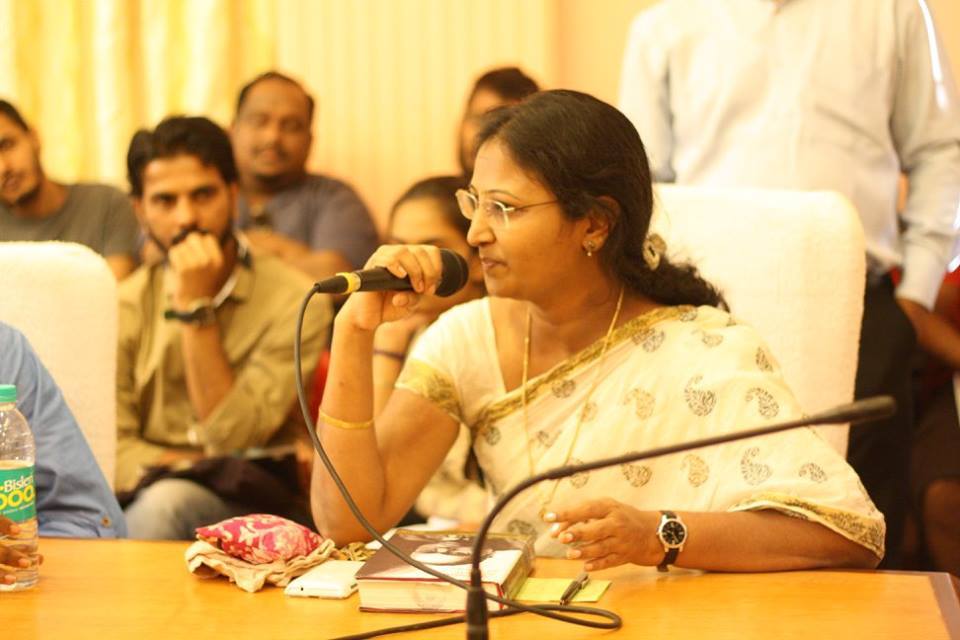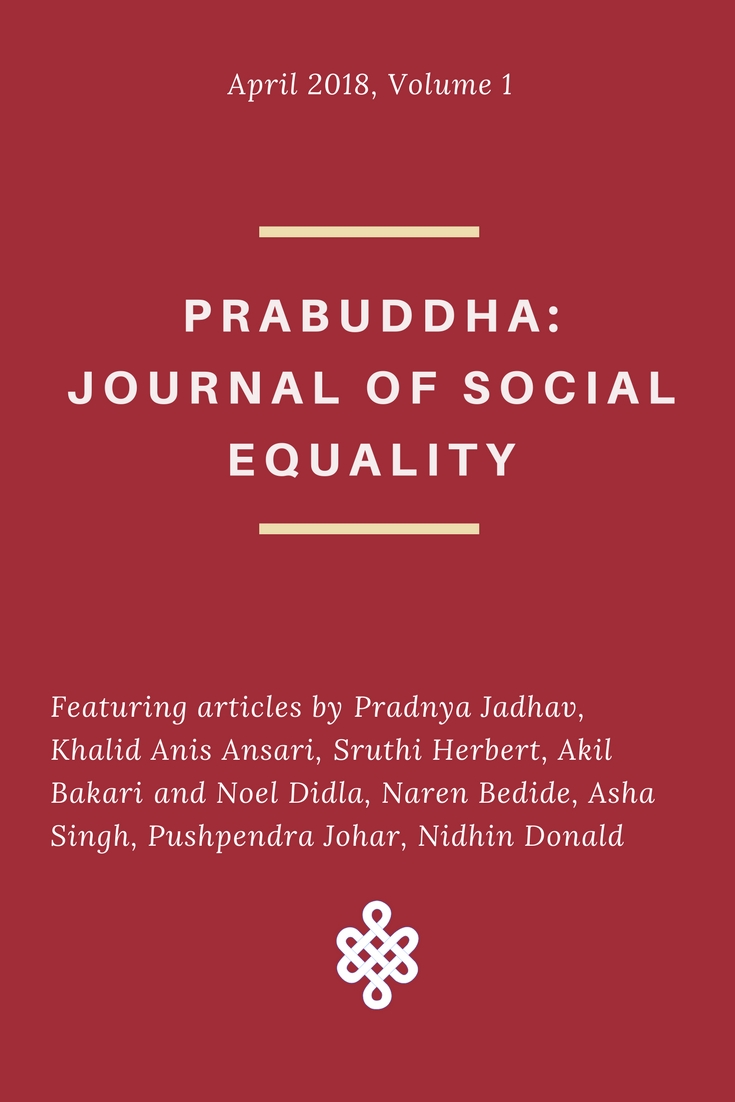Sangeeta Pawar
Excerpt from the discussion at the Colonization of Ambedkar event, University of Mumbai, 21st December 2014.
Respected chief guest of this session, Suresh Mane sir, Kuffir sir, Anoopji, Michael, other organizers of this deliberation and my dear participant friends,
I want to begin this talk with the introductory aspects connected with the book. The minute this book came to my hand, I began with the first page and immediately I was tempted to go to the last part, that is the acknowledgment page. The reason why I had to jump directly to the acknowledgement page is to know actually what references the author has given, who have helped her in her endeavour, whether any Dalit writers have helped her or not, and how well-read the author is.
Her own statement in the book is that ‘revolutions come by reading’. And is she justified in making that statement? I ask that, because if you want to talk about a writer or author, and want to preface his/her text that has already been published – and that too when you dare to touch Babasaheb Ambedkar’s ‘Annihilation of Caste’ – then you cannot justify it unless you’ve read it well enough.
- Dr Sangeeta Pawar at the ‘Colonization of Ambedkar’ event – Picture courtesy: Daisy Katta
The very journey of the book from the start begins with all kinds of misleading quotations and understandings and observations. Let me be very precise with you. When I went through it, right from the first part of the page through the 150 pages of introduction, the haunting thought that came to my mind and would occur to every other readers mind irrespective of the role one plays as a civilian, professional, academician or an activist is, ‘why does Annihilation of Caste, one of Babasaheb Ambedkar’s greatest works require a reintroduction? And when it has to be a reintroduction, why should it be a kind of a debatable reintroduction where you’re trying to prove that Gandhi was a saint and Dr. Babasaheb Ambedkar was talking about caste? The pyramid of caste and caste hierarchy with the caste at bottom as polluters and on top -caste signifying purity – should this narration of the author carry any mileage? And does this not invite hatred on the basis of caste from the upper caste people towards the marginalized sections and downtrodden people of the society. The author has a wrong contemplation about annihilation of caste and is misusing Babasaheb Ambedkar’s perception of annihilation of caste. Such contradictions have sensitized the Dalit community deeply.
As a reader I fail to understand why she has begun with Malala’s fight for peace, justice and right of girl child for education and connecting it with Surekha Bhotmange (the Khairlanji murders). She further says that if you’ve heard of Malala and you’ve not heard of Surekha Bhotmange, then you have to read Babasaheb Ambekdar! So from there on, the book goes on talking about caste, what are the types of problems that the castes have in India, how the hierarchy begins and then she tries to corroborate these contentions, and moves into a different kind of journey, where she comes down to the Baniyas, the Vaishyas and then to the corporate sector, coming out with statistical figures about what are the types of discriminations happening in India, and then talking back-to-back about colonization, imperialism, racism, casteism etc. There so many aspects that are completely baffling! Rarely can one can have a pleasant experience if your plate is heaped up with too many dishes – you don’t know where to start eating from. And if you instead begin with having an ounce of everything, then you’re not satisfied with any of the dishes. Such is the experience that one has after reading the book.
A reader consumes a matter, viewpoint or an idea about a book to gain satisfaction, and then develop a loyalty towards what he or she is agreeing with from the author’s observations. As an Ambedkarite follower, I would always have that kind of loyalty towards Babasaheb’s original ‘Annihilation of Caste’, and I don’t gel with the interest of understanding or even thinking of digesting what Arundhati Roy is trying to bring before the audience. My humble submission is that if you hide the name of the author, and ask somebody to give an exact review of this book, then I guess it will be a critical appraisal. There are so many contradictions in the book that, if you read and analyze it, it can leave you entirely baffled.
I also wish to ask whether the book has any relevance or not. If the relevance of a book is in terms of its appeal and orientation, I find that for me, this book has zero relevance. Why would you buy a book that has a feeling of theatricality, but no intellectual relevance? Why strangulate the essence of the original script of Babasaheb Ambedkar? Why mislead the audience? Why adopt a narrower approach that dilutes the originality of the text?
So, how do you really justify the book? To me, there are certain things about the book which are objectionable. In some part of the book, she talks about the corporate sector and quotes figures about the Baniyas and Vaishyas ruling the entire corporate market. And then, if somebody reads it, as a plain reader, or say if one of my commerce student read it, they might carry the notion that ‘ Yes, the people belonging to the Dalit group cannot make their way up to that level’. So there is a specification of this particular stigma attached to caste, for example, that they are not educationally developed, there are discriminations etc… So a kind of a social sympathy is what is invoked. But gone are the days when the Dalit community had to look forward for this kind of support and sympathy. This community now thinks in a larger dimension, from the point of view of our social rights and obligations.
Now my dear friends, it’s not as if I need to read Ambedkar and talk about AoC, but not read Gandhi because I am an Ambedkarite. We all are well read people, we have read Gandhi several times, we have read Ambedkar several times. We are mature enough to understand what the debate between these two people was, and after that, if we still choose to follow Babasaheb Ambedkar, it is because we understand the need to address the casteist forces that are hindering the development of our economy. From that perspective, I personally feel that the book does not actually justify what the overall theme of ‘Annihilation of caste’ is. The title itself is objectionable.
I am sympathizing with Arundhati Roy – she should have taken a little more care, because her name matters. In fact, if we consider this write-up on AoC, we cannot say that she is a great icon, despite her success with the ‘God of Small Things’. When it comes to this particular book, she has somewhere failed to give a proper introduction.
Thank you so much for allowing me to speak.
~
Dr. Sangeeta Pawar is Associate Professor in the Department of Commerce, University of Mumbai & Co-ordinator, Dr. Babasaheb Ambedkar Research & Training Institute (BARTI)
~~~
This talk has been transcribed by Sruthi Herbert.


